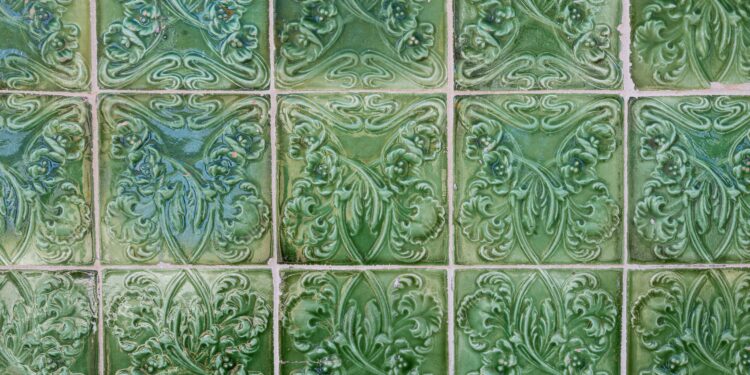Inside Nigeria tile industry where inflation is giving local tiles an edge | Prestige Real Estate News

By Caleb Obiowo
For Bright Emmanuel, the manager at De Zervant Ventures in Ikorodu, Lagos, selling tiles is more than just a business—it’s a lens through which he observes the broader economic realities facing Nigerians today.
“Prices don’t lie,” Emmanuel often remarks, “but tiles do.”
This expression encapsulates the challenges he navigates daily, where the fluctuating costs of tiles reflect the shifting priorities of consumers and the far-reaching impact of inflation on the construction industry.

As inflation tightens its grip on Nigeria’s economy, Emmanuel has noticed a significant shift in his customers’ purchasing patterns. What was once a straightforward decision based primarily on aesthetic preference has evolved into a complex balancing act involving cost, quality, and safety.
This transformation is not limited to tiles but is part of a broader trend across the building materials sector, where rising prices force both consumers and suppliers to make tough choices.

The impact of rising costs on building materials
The tile market is just one segment of Nigeria’s construction industry feeling the strain of inflation.
According to recent data from the National Bureau of Statistics (NBS), the Furnishings & Household Equipment Maintenance inflation rate rose by 18.5% as of July 2024, marking the highest increase since May 1996.

This surge reflects the broader inflationary pressures affecting everything from cement and steel to roofing materials and, of course, tiles.
As costs rise across the board, the financial burden on builders and homeowners alike is becoming increasingly severe.
In Lagos, a key hub for construction in Nigeria, this trend is particularly pronounced. Emmanuel’s experience at De Zervant Ventures mirrors the challenges facing the entire sector.
His customers, whether they are individual homeowners or large-scale contractors, are all feeling the pinch. Many are now reconsidering their choices, often opting for more affordable, locally-produced tiles instead of the premium imports from Italy and Spain that were once more common.

The complexities of Tile choices in Nigeria
Tiles have become an integral part of Nigeria’s building industry, not just as a design element, but as a crucial component of structural integrity and safety.
Whether it’s a luxury mansion in Lekki or a modest bungalow in Ikorodu, the type of tiles used can significantly impact the look and feel of a space.
More importantly, they determine how safe that space will be for its occupants, especially in homes with children and the elderly.
In a market where inflation is pushing prices higher and consumer preferences are constantly evolving, the choice of tiles has never been more important.

While Nigerian-made tiles are often the go-to for budget-conscious buyers, those with deeper pockets still prefer the durability and premium finish of Italian and Spanish imports.
Emmanuel has observed this shift firsthand at De Zervant Ventures, where customers now scrutinize every detail—size, material, origin—before making a purchase.
Tile prices surge year on year
To grasp the full picture of Nigeria’s tile market, it’s essential to consider the numbers.
A survey conducted by Nairametrics in August 2024 offers a clear comparison of tile prices over the past year, revealing substantial increases across the board.
For instance, a carton of 25×50 cm tiles, commonly used for exterior walls, has jumped from N3,000 in August 2023 to nearly double that at N5,800 in August 2024.
Similarly, the 30×60 cm tiles, popular for both commercial and residential floors, now cost as much as N7,000 per carton, compared to N4,000 a year earlier.
These price hikes, while daunting, have not entirely dampened demand. Emmanuel notes that while some customers have switched to more affordable options, the essential role of tiles in building projects means they remain a non-negotiable purchase for most.
Tile Prices
- 25×50 cm tiles (typically used for exterior walls)
August 2024: N5,600 – N5,800 (12 pieces per carton)
August 2023: N3,000 – N3,200
- 25×40 cm tiles (commonly used for kitchen and bathroom walls)
August 2024: N5,100 – N5,300 (15 pieces per carton)
August 2023: N2,500 – N2,700
- 30×30 cm tiles
August 2024: N6,600 – N6,800 (11 pieces per carton)
August 2023: N3,700 – N3,900
- 40×40 cm tiles (plain)
August 2024: N6,100 – N6,300 (12 pieces per carton)
August 2023: N3,330 – N3,500
- 30×60 cm tiles
August 2024: N6,800 – N7,000
August 2023: N4,000
- 60×60 cm tiles
De Zervant Ventures (August 2024): N10,000 – N10,200 (4 glazed tiles per carton)
Other shops in Mushin: N6,500 – N6,700
- Unglazed tiles: Approximately N1,000 more per carton 120×60 cm tiles
August 2024: N13,000 – N14,000 (2 pieces per carton)
August 2023: Around N10,000
Tile types and their applications
In the world of tiles, variety is key, but each type serves a specific purpose. Emmanuel explains that tiles can be broadly categorized into glazed and unglazed varieties, each offering distinct advantages.

Glazed tiles, with their smooth, shiny finish, are perfect for kitchens and bathrooms where stain resistance is a priority. However, their low grip makes them unsuitable for wet areas where slips and falls could occur—an important consideration for families with young children or elderly residents.
Unglazed tiles, on the other hand, are valued for their natural, matte finish, providing better traction in high-traffic or outdoor areas. Their rougher texture makes them a safer choice, despite being slightly more expensive than their glazed counterparts.
The design and size of tiles also play crucial roles in their selection. Larger tiles, such as the 60×60 cm or the grand 120×60 cm varieties, are becoming increasingly popular for creating seamless, expansive surfaces, particularly in modern homes and offices.
Graphite tiles, known for their sleek, stone-like appearance, are another trend on the rise, bringing a touch of sophistication to both residential and commercial spaces.
Balancing budget and safety
Building contractors are on the front lines of these market changes, often needing to adjust their strategies to meet both budgetary constraints and client expectations.
Nairametrics spoke with two seasoned contractors in Lagos, Moses Ibiyemi, CEO of Mosyem Concept & Associates, and Rose of Sharon, CEO of Rosprocoop Nigeria Limited, to gain insights into how they are navigating these challenges.
Ibiyemi stresses that client preferences and budget constraints are the main drivers of tile choices in any project. While some clients have scaled back their tile selections due to rising costs, others maintain their preferred aesthetic despite the financial pressure.
“While inflation has pushed some clients to alter their tile choices to save costs, most still prioritize their preferences, regardless of the price,” he explained.
When working on government projects, Ibiyemi highlighted the challenges posed by price fluctuations between the time of quoting and the start of a project. In such cases, practical adjustments are necessary to ensure the project stays on track, often requiring the use of more affordable materials to prevent delays.
Ibiyemi further pointed out that while imported tiles, such as those from Italy and Spain, are more expensive, they are also more durable and less prone to breakage during transportation and installation.
This durability often results in less wastage, reducing the overall quantity of tiles needed compared to locally-produced Nigerian tiles, which are more prone to breakage.
Ibiyemi also highlights a key safety concern: the use of glazed tiles in wet areas. “Accidents in kitchens and bathrooms can be avoided with the right tile choices,” he advises, noting that while imported tiles are pricier, their durability and reduced breakage rates often justify the higher cost.
Rose of Sharon, who frequently handles residential projects, places a strong emphasis on safety.
She echoed the importance of safety in tile selection, particularly for homes with children or elderly residents.
“I usually recommend unglazed tiles for clients with kids or elderly people, as they are less likely to cause slips and falls,” she said.
She advises her clients, especially those with children or elderly family members, to opt for unglazed tiles despite the additional cost.
Although unglazed tiles may be slightly more expensive than their glazed counterparts, she believes the initial investment is worth it to avoid future accidents and the need for replacement as clients age.
“The extra grip they provide can prevent accidents and is worth the investment,” she says, underscoring the long-term value of such decisions.
Future outlook
The Nigerian tile market is in a state of flux, driven by inflation and changing consumer needs.
While locally-produced tiles have seen price hikes of 50-70% in the past year, demand has remained resilient, if slightly reduced.
Clients with higher budgets continue to favor imported tiles for their superior quality, especially in luxury projects.
Safety is becoming an increasingly important consideration in tile selection, with unglazed tiles gaining popularity due to their better grip.
Meanwhile, aesthetic trends such as the preference for larger tiles and sleek designs like graphite are shaping the future of the market.
For sellers like Emmanuel, the tile business is as much about understanding market dynamics as it is about offering quality products.
Every day, he navigates the delicate balance between affordability, safety, and style, ensuring that his customers walk away with the best tiles for their needs—tiles that will not only lie flat on their floors but will also tell the true story of their home or business.
- Culled from Nairametrics






